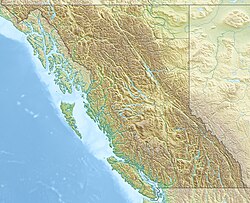| Collier Peak | |
|---|---|
| Highest point | |
| Elevation | 3,232 m (10,604 ft) [1] [a] |
| Prominence | 94 m (308 ft) [1] |
| Listing | |
| Coordinates | 51°23′27″N116°18′12″W / 51.39083°N 116.30333°W [4] |
| Geography | |
| Country | Canada |
| Provinces | Alberta and British Columbia |
| Parent range | Bow Range [5] [4] [1] |
| Topo map | NTS 82N8 Lake Louise [4] |
| Climbing | |
| First ascent | 1893 H.P. Nichols, Samuel E.S. Allen [6] [1] |
Collier Peak is located between Mount Victoria and Popes Peak and straddles the Continental Divide marking the Alberta-British Columbia border. It was named in 1903 after Dr. Joseph Collier. [2] [1] [6]


